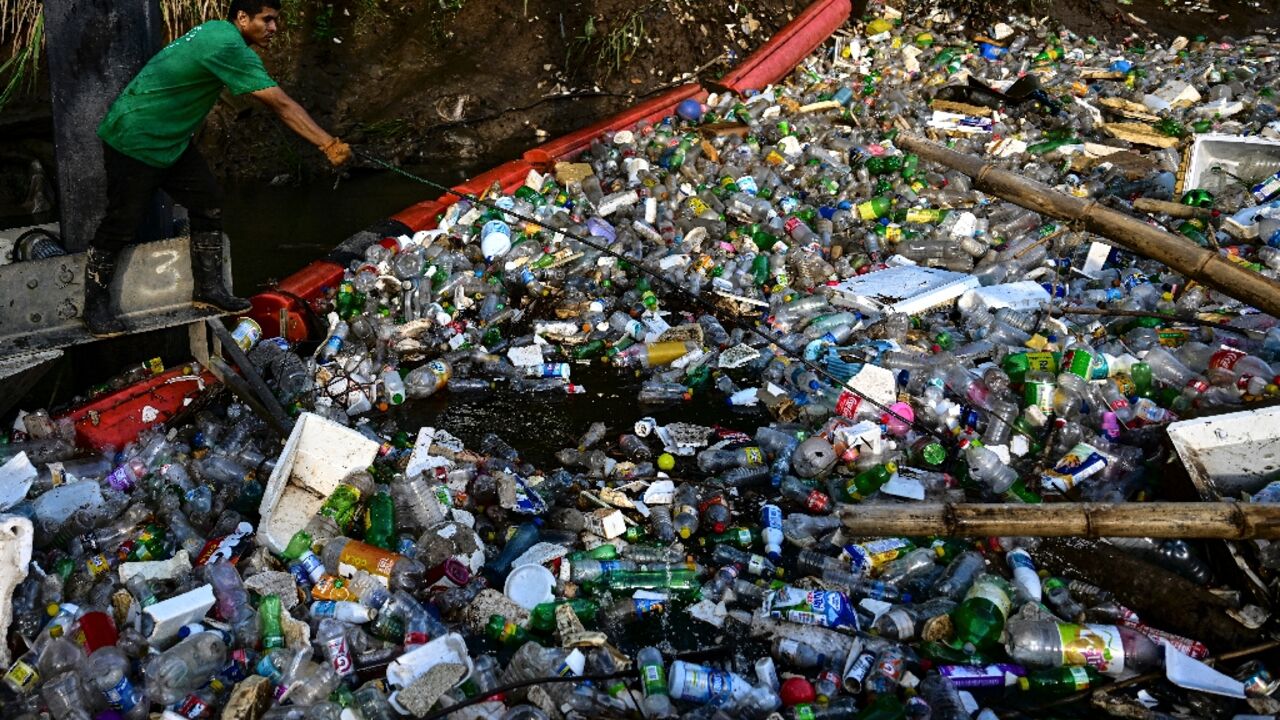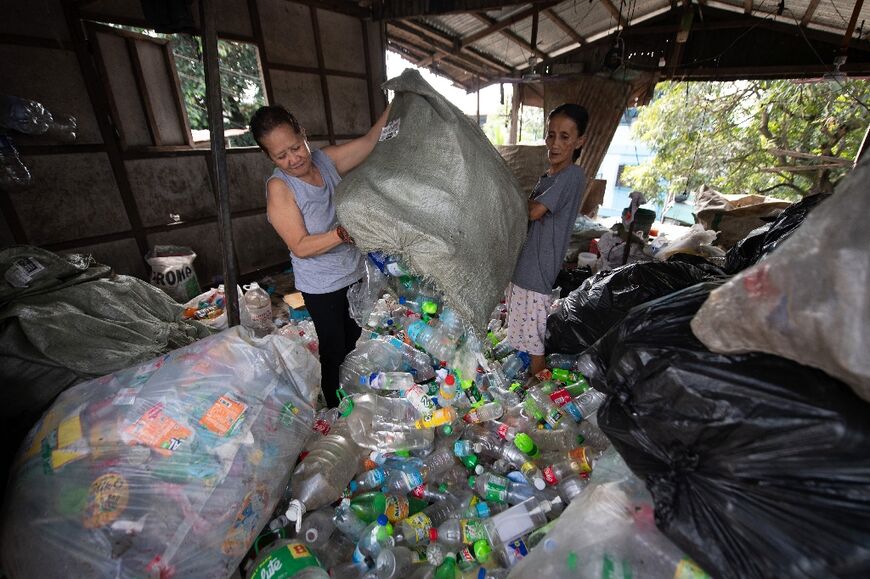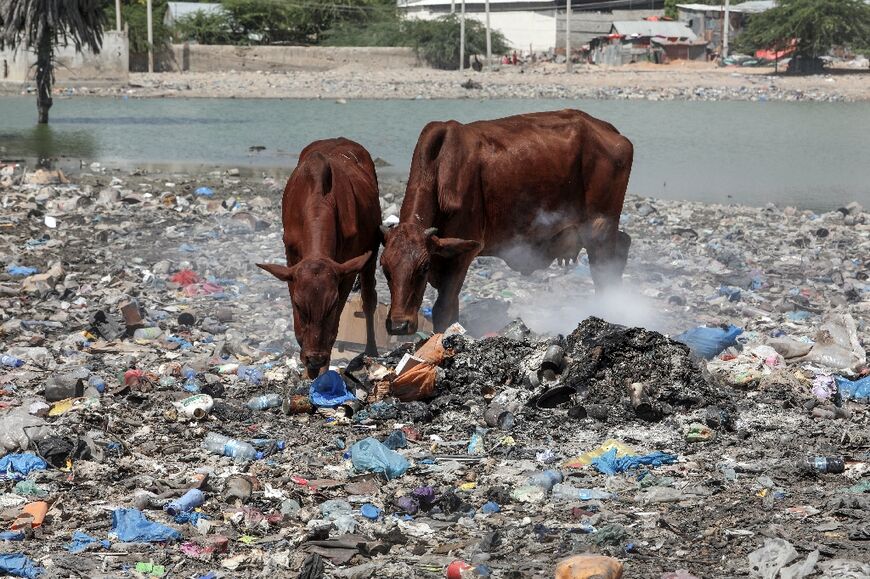'Moment of truth' for world-first plastic pollution treaty
by Sara Hussein with Isabel Malsang in Paris
Nov 21, 2024
AFP


It is a more manageable 17 pages, and highlights areas of agreement, including the need to promote reusability.
However, it leaves the thorniest issues largely unaddressed.
A European diplomat, speaking on condition of anonymity, warned the document was "not ambitious enough" on a range of subjects.
The assessment from the Center for International Environmental Law was blunter: "The text would deliver an ineffective and useless treaty and it would fail to adequately address the plastic crisis."
Key to any agreement will be the United States and China, neither of which have openly sided with either bloc.
Earlier this year, Washington raised hopes among environmentalists by signalling support for some limits on production, a position that is reportedly now being rowed back.
The election of Donald Trump has also raised questions about how ambitious the US delegation will be, and whether negotiators should even bother seeking US support if a treaty is unlikely to be ratified by Washington.
Some plastic producers are pushing governments to focus on waste management and reusability, warning production caps would cause "unintended consequences".
But others back a deal with global standards, including on "sustainable" production levels.
"Expectations are high ahead of Busan," said Eirik Lindebjerg, global plastics policy lead at conservation group WWF.
An "overwhelming majority" of countries already back binding rules across the plastic lifecycle, he told AFP.
"It is now up to the leaders of those countries to deliver the treaty the world needs and not let a handful of unwilling countries or industry interests stop this."
by Sara Hussein with Isabel Malsang in Paris
Nov 21, 2024
AFP

Plastic pollution litters our seas, our air and even our bodies, but negotiators face an uphill battle next week to agree on the world's first treaty aimed at ending the problem — Martin BERNETTI
Plastic pollution litters our seas, our air and even our bodies, but negotiators face an uphill battle next week to agree on the world's first treaty aimed at ending the problem.
Countries will have a week in South Korea's Busan from Monday to round off two years of negotiations.
They remain deeply divided on whether the deal should limit plastic production and certain chemicals, and even if the treaty should be adopted by majority vote or consensus.
The talks are a "moment of truth", UN Environment Programme chief Inger Andersen warned this month.
"Busan can and must mark the end of the negotiations," she insisted, in a nod to growing speculation that the process could be extended.
She acknowledged that serious differences remain, urging "more convergence" on the most difficult areas.
"Everyone wants an end to plastic pollution," she said.
"Now it is up to member states to deliver."
There is little dispute about the scale of the problem.
In 2019, the world produced around 460 million tonnes of plastic, a figure that has doubled since 2000, according to the Organisation for Economic Co-operation and Development.
Plastic production is expected to triple by 2060.
- Fault-line -

More than 90 percent of plastic is not recycled, with over 20 million tonnes leaking into the environment, often after just a few minutes of use.
Microplastics have been found in the deepest parts of the ocean, the world's highest mountain peaks and just about every part of the human body.
Plastic also accounts for around three percent of global emissions, mostly linked to its production from fossil fuels.
The main fault-line in talks is where to tackle the problem.
Some countries, including the so-called High Ambition Coalition (HAC) that groups many African, Asian and European nations, want to discuss the entire "lifecycle" of plastics.
That means limiting production, redesigning products for reuse and recycling, and addressing waste.
On the other side are countries, largely oil producers like Saudi Arabia and Russia, who want a downstream focus on waste alone.
The HAC wants binding global targets on reducing production and warned ahead of the Busan talks that "vested interests" should not be allowed to hamper a deal.
The divisions have stymied four previous rounds of talks, producing an unwieldy document of over 70 pages.
The diplomat chairing the talks has produced an alternative document intended to synthesise the views of delegations and move negotiations forward.
- 'Expectations are high' -
Plastic pollution litters our seas, our air and even our bodies, but negotiators face an uphill battle next week to agree on the world's first treaty aimed at ending the problem.
Countries will have a week in South Korea's Busan from Monday to round off two years of negotiations.
They remain deeply divided on whether the deal should limit plastic production and certain chemicals, and even if the treaty should be adopted by majority vote or consensus.
The talks are a "moment of truth", UN Environment Programme chief Inger Andersen warned this month.
"Busan can and must mark the end of the negotiations," she insisted, in a nod to growing speculation that the process could be extended.
She acknowledged that serious differences remain, urging "more convergence" on the most difficult areas.
"Everyone wants an end to plastic pollution," she said.
"Now it is up to member states to deliver."
There is little dispute about the scale of the problem.
In 2019, the world produced around 460 million tonnes of plastic, a figure that has doubled since 2000, according to the Organisation for Economic Co-operation and Development.
Plastic production is expected to triple by 2060.
- Fault-line -

More than 90 percent of plastic is not recycled, with over 20 million tonnes leaking into the environment, often after just a few minutes of use.
Microplastics have been found in the deepest parts of the ocean, the world's highest mountain peaks and just about every part of the human body.
Plastic also accounts for around three percent of global emissions, mostly linked to its production from fossil fuels.
The main fault-line in talks is where to tackle the problem.
Some countries, including the so-called High Ambition Coalition (HAC) that groups many African, Asian and European nations, want to discuss the entire "lifecycle" of plastics.
That means limiting production, redesigning products for reuse and recycling, and addressing waste.
On the other side are countries, largely oil producers like Saudi Arabia and Russia, who want a downstream focus on waste alone.
The HAC wants binding global targets on reducing production and warned ahead of the Busan talks that "vested interests" should not be allowed to hamper a deal.
The divisions have stymied four previous rounds of talks, producing an unwieldy document of over 70 pages.
The diplomat chairing the talks has produced an alternative document intended to synthesise the views of delegations and move negotiations forward.
- 'Expectations are high' -

It is a more manageable 17 pages, and highlights areas of agreement, including the need to promote reusability.
However, it leaves the thorniest issues largely unaddressed.
A European diplomat, speaking on condition of anonymity, warned the document was "not ambitious enough" on a range of subjects.
The assessment from the Center for International Environmental Law was blunter: "The text would deliver an ineffective and useless treaty and it would fail to adequately address the plastic crisis."
Key to any agreement will be the United States and China, neither of which have openly sided with either bloc.
Earlier this year, Washington raised hopes among environmentalists by signalling support for some limits on production, a position that is reportedly now being rowed back.
The election of Donald Trump has also raised questions about how ambitious the US delegation will be, and whether negotiators should even bother seeking US support if a treaty is unlikely to be ratified by Washington.
Some plastic producers are pushing governments to focus on waste management and reusability, warning production caps would cause "unintended consequences".
But others back a deal with global standards, including on "sustainable" production levels.
"Expectations are high ahead of Busan," said Eirik Lindebjerg, global plastics policy lead at conservation group WWF.
An "overwhelming majority" of countries already back binding rules across the plastic lifecycle, he told AFP.
"It is now up to the leaders of those countries to deliver the treaty the world needs and not let a handful of unwilling countries or industry interests stop this."

A mountain of about 19,000 tonnes of finely ground plastic waste is piled up untreated at a shuttered plastic recycling site in Asan, about 85 kilometers south of Seoul.
https://arab.news/cmdne
Reuters
November 22, 2024
South Korea says that it recycles 7% of its plastic waste, compared to about 5%-6% in the US
SEOUL: South Korea has won international praise for its recycling efforts, but as it prepares to host talks for a global plastic waste agreement, experts say the country’s approach highlights its limits.
When the talks known as INC-5 kick off in Busan next week, debate is expected to center around whether a UN treaty should seek to limit the amount of plastic being made in the first place.
South Korea says that it recycles 73 percent of its plastic waste, compared to about 5 percent-6 percent in the United States, and the country might seem to be a model for a waste management approach.
The bi-monthly MIT Technology Review magazine has rated South Korea as “one of the world’s best recycling economies,” and the only Asian country out of the top 10 on its Green Future Index in 2022.
But environmental activists and members of the waste management industry say the recycling numbers don’t tell the whole story.
South Korea’s claimed rate of 73 percent “is a false number, because it just counts plastic waste that arrived at the recycling screening facility — whether it is recycled, incinerated, or landfilled afterward, we don’t know,” said Seo Hee-won, a researcher at local activist group Climate Change Center.
Greenpeace estimates South Korea recycles only 27 percent of its total plastic waste. The environment ministry says the definition of waste, recycling methods and statistical calculation vary from country to country, making it difficult to evaluate uniformly.
South Korea’s plastic waste generation increased from 9.6 million tons in 2019 to 12.6 million tons in 2022, a 31 percent jump in three years partly due to increased plastic packaging of food, gifts and other online orders that mushroomed during the pandemic, activists said. Data for 2023 has not been released.
A significant amount of that plastic is not being recycled, according to industry and government sources and activists, sometimes for financial reasons.
At a shuttered plastic recycling site in Asan, about 85km south of Seoul, a mountain of about 19,000 tonnes of finely ground plastic waste is piled up untreated, emitting a slightly noxious smell. Local officials said the owner had run into money problems, but could not provide details.
“It will probably take more than 2-3 billion won ($1.43 million-$2.14 million) to remove,” said an Asan regional government official. “The owner is believed unable to pay, so the cleanup is low priority for us.”
Reuters has reported that more than 90 percent of plastic waste gets dumped or incinerated because there is no cheap way to repurpose it, according to a 2017 study.
NO CONCRETE GOALS
South Korean government’s regulations on single-use plastic products have also been criticized for being inconsistent. In November 2023, the environment ministry eased restrictions on single-use plastic including straws and bags, rolling back rules it had strengthened just a year earlier.
“South Korea lacks concrete goals toward reducing plastic use outright, and reusing plastic,” said Hong Su-yeol, director of Resource Circulation Society and Economy Institute and an expert on the country’s waste management.
Nara Kim, a Seoul-based campaigner for plastic use reduction at Greenpeace, said South Korea’s culture of valuing elaborate packaging of gifts and other items needs to change, while other activists pointed to the influence of the country’s petrochemical producers.
“Companies are the ones that pay the money, the taxes,” said a recycling industry official who declined to be identified because of the sensitivity of the issue, adding that this enabled them to wield influence. “The environment ministry is the weakest ministry in the government.”
The environment ministry said South Korea manages waste over the entire cycle from generation to recycling and final disposal.
The government has made some moves to encourage Korea Inc. to recycle, including its petrochemical industry that ranks fifth in global market share.
President Yoon Suk Yeol said at the G-20 summit on Tuesday that “efforts to reduce plastic pollution must also be made” for sustainable development, and that his government will support next week’s talks.
The government has changed regulations to allow companies like leading petrochemical producer LG Chem to generate naphtha, its primary feedstock, by recycling plastic via pyrolysis. SK Chemicals’ depolymerization chemical recycling output has already been used in products such as water bottles as well as tires for high-end EVs.
Pyrolysis involves heating waste plastic to extremely high temperatures causing it to break down into molecules that can be repurposed as a fuel or to create second-life plastic products. But the process is costly, and there is also criticism that it increases carbon emissions.
“Companies have to be behind this,” said Jorg Weberndorfer, Minister Counsellor at the trade section of the EU Delegation to South Korea.
“You need companies who really believe in this and want to have this change. I think there should be an alliance between public authorities and companies.”
No comments:
Post a Comment